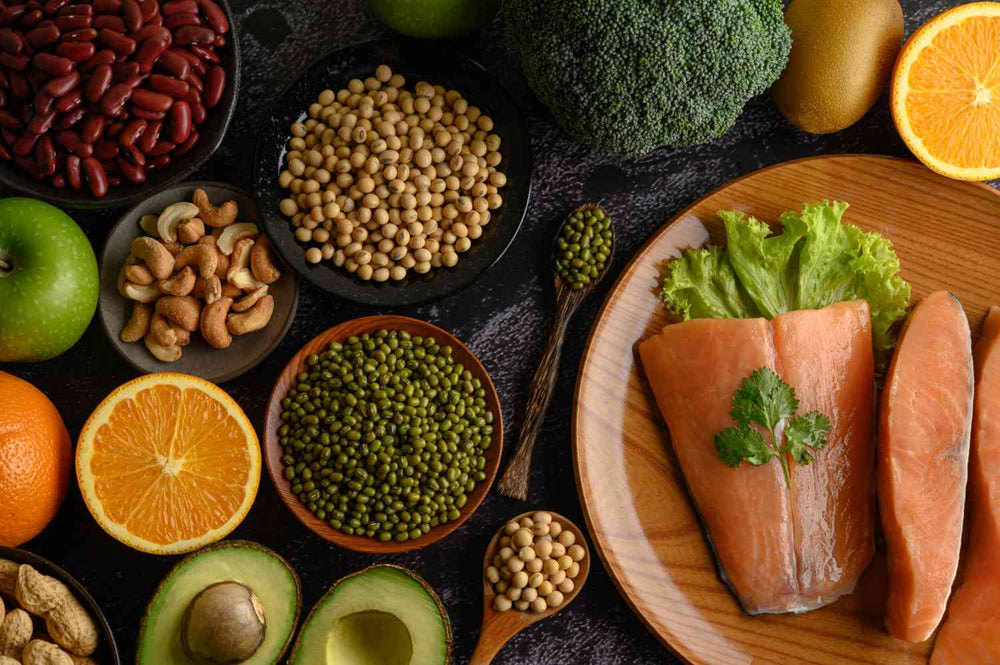ESSENTIAL AMINO ACIDS: WHAT THEY ARE, WHAT THEY ARE AND WHY WE NEED THEM
You may have heard that the nutrients that make up the foods we eat are divided into micronutrients and macronutrients . The first are vitamins and minerals, while the second are carbohydrates, fats and proteins.
Macronutrients have a more complex structure than micronutrients, which is why the digestive system has to “break” them into smaller molecules. In the case of proteins, the molecules that form them are amino acids , which our body acquires through the processes of digestion and absorption.
However, not all amino acids are the same, and, in fact, they are differentiated into essential amino acids and non-essential amino acids .
Essential Amino Acids vs Non-Essential Amino Acids
There are many amino acids in nature, although only twenty of them form the proteins that we need so much .
Of those twenty, nine are known as essential amino acids because our body either cannot produce them or does not do so in sufficient quantity to carry out its functions correctly. Therefore, we must take essential amino acids from the outside, through food.
Non-essential amino acids , on the other hand, are those that the body can produce and, in healthy conditions, no additional intake through the diet is required.
As its name indicates, essential amino acids are essential for the proper functioning of our body , so much so that, if their levels are not sufficient, we can suffer different health problems.
The 9 essential amino acids your body needs
1) Lysine
Lysine is an essential amino acid necessary for the formation of collagen , the “cement” with which we build our bones, tendons, ligaments, cartilage and skin. In addition, it contributes to the absorption of calcium and reduces the amount that is eliminated through urine.
Given its function, the main complications of lysine deficiency are poor calcium absorption (which in turn causes other complications), fatigue or exhaustion, dizziness and even growth inhibition.
There are very few foods of plant origin that have lysine, but all foods of animal origin contain this essential amino acid: red meat, poultry, eggs, cheeses...
2) Threonine
Threonine also cannot be produced in sufficient quantity by the body, making it another of the essential amino acids.
Threonine supports liver function by preventing the accumulation of fat in it, and participates in many processes related to glycine (a non-essential amino acid).
It is also important for the synthesis of digestive enzymes and immune system proteins ; Therefore, a deficiency in threonine consumption can affect the immune and digestive systems.
Among the many foods that include threonine, we can talk about chard, avocado, whole grains and nuts, of plant origin, and pork, lamb, turkey, cottage cheese and eggs as foods of animal origin high in threonine.

3) Leucine
The third essential amino acid is leucine, one of the amino acids our cells use to synthesize proteins , which is why it is especially important for the growth and maintenance of muscle tissue .
Due to the function it plays in the body, leucine deficiency can cause weakness and loss of the tissue that makes up muscles, which is usually accompanied by low energy levels.
This essential amino acid is present in foods of animal origin, such as eggs, milk, beef and red meat, but its presence is also important in legumes such as peas, lentils or chickpeas.
4) Isoleucine
With an identical chemical composition to that of leucine, isoleucine is also used by cells for protein synthesis . And, as with the previous amino acid, it helps in the formation of muscle tissue and promotes recovery after exercise .
At the same time, this essential amino acid favors the entry of other nutrients into the cells, can replace glucose during prolonged fasts and has ketogenic capacity. The deficiency of isoleucine in the body causes symptoms of tiredness and fatigue (similar to leucine), as well as problems in the skin tissue.
To avoid these complications, it is recommended to consume foods high in isoleucine, such as eggs, turkey, chicken, lamb, fish and, of plant origin, dried peas and soybeans, for example.
5) Valine
Together with leucine and isoleucine, valine closes the group of so-called essential branched amino acids.
Its functions in the body are similar to those performed by leucine and isoleucine, such as the formation and repair of muscle tissue , and the provision of energy during muscular stress (exercise). Not to mention that it also helps regulate the immune system and keeps blood sugar levels balanced .
There are many foods with high levels of this essential amino acid. For example, of plant origin, we can mention brown rice, banana, peanuts, legumes, red fruits and chocolates. Of animal origin, eggs, a wide variety of cheeses and salted cod.

6) Tryptophan
The next essential amino acid is tryptophan, and, due to its function as a precursor to serotonin, we could say that it is the “amino acid of happiness” . Indeed, this hormone is related to the control of emotions, mood and appetite .
However, tryptophan is also essential for the synthesis of melatonin , responsible for regulating sleep and wakefulness, and vitamin B3, which contributes to the proper functioning of the circulatory and nervous system.
Some plant-based foods that have high levels of tryptophan are legumes, nuts such as peanuts and cashews, and dark chocolate. Regarding those of animal origin, the foods with the highest concentrations of tryptophan are white meat, eggs, fish and dairy products.
7) Phenylalanine
Phenylalanine is used for the synthesis of tyrosine , a non-essential amino acid that is involved in the regulation of the thyroid, a gland that performs several vital functions. Likewise, tyrosine is associated with the synthesis of dopamine and melanin .
Therefore, a deficiency in phenylalanine consumption could lead to symptoms of depression or lack of mood, in addition to causing imbalances in the thyroid gland due to insufficient tyrosine, among other complications.
We can find several foods of plant origin with high levels of phenylalanine, such as rice, white bread, whole wheat bread, corn, banana, chia seeds and pumpkin seeds. Of animal origin, dairy products, fish and eggs have high concentrations of this essential amino acid.
8) Methionine
The penultimate essential amino acid is methionine, which is used as a precursor to a non-essential amino acid called cysteine . Cysteine, synthesized from methionine, has great antioxidant and purifying power, which is why it intervenes in the body's metabolic and lymphatic processes.
For this reason, not consuming a sufficient amount of methionine, with the consequent deficiency of cysteine, can increase the levels of toxins in the body, accelerate cellular aging and hinder the absorption of other nutrients.
Whole grains, soy, nuts and onions are plant foods with high levels of methionine. You will also receive a great supply of this essential amino acid thanks to meat, eggs, fish and dairy products.
9) Histidine
Finally, we have to talk about histidine, an essential amino acid that helps in the growth and repair of tissues , especially myelin, the tissue that protects nerves.
However, histidine is also involved in the production of red blood cells and white blood cells , which is why it is necessary for the maintenance of the circulatory system and the immune system.
Most foods rich in protein have high levels of this essential amino acid (meat, fish, eggs, dairy products), but it is also found in foods of plant origin such as beans, soy or mushrooms.
Essential amino acids in food
Foods of animal origin
Foods of animal origin have great nutritional value , since they contain all the essential (and even non-essential) amino acids that our body needs to correctly carry out its functions.
Thus, all meats (pork, beef, lamb, chicken, turkey, rabbit...), fish such as tuna, sardine, salmon or grouper, dairy products and eggs cannot be missing from a balanced diet to ensure provide our body with adequate amounts of essential amino acids.
In fact, the bioavailability and high quality of animal proteins are the reasons why we, at Impossible Bakers , make most of our products with this type of protein, such as eggs and whey.
Vegetarian food
Although there are several foods of plant origin that have good concentrations of essential amino acids, most of them lack some .
Lysine is the most difficult amino acid to find in plant foods , and those that do have it do not have sufficient concentration for the body to take advantage of it. For this reason, it is advisable to make up for the lack of essential amino acids by incorporating foods of animal origin, since the bioavailability of amino acids is greater in the latter.
For example, most nuts, seeds, soy, whole grains, chickpeas, peas, and beans , among others, will provide you with several of the essential amino acids.

Proteins, the protagonists of any diet
Due to the many vital functions they perform, proteins (or the essential amino acids that make them up) must be present in any person's diet , adjusting their quantity more or less depending on their needs.
As we have seen, in addition to those of animal origin, which must be consumed in a balanced way, there are other foods of plant origin with good levels of essential amino acids ... only too many carbohydrates , a type of macronutrients that many people consume in excess (for example example, bread).
In fact, the benefits of the essential amino acids of this type of food are “counteracted” by their high level of carbohydrates , such as white sugar, the ubiquitous sweetener that can cause diseases such as overweight or obesity, diabetes, cardiovascular problems, liver fatty… In other words, a loss of quality of life.
For all these reasons, at Impossible Bakers we make products with a high level of protein and a lower amount of carbohydrates , so that you provide your body with essential amino acids without having to saturate it with empty calories.
Whether you follow a muscle definition diet, a weight loss diet, a keto diet or you simply want to give your body what it REALLY needs , click here and start taking care of yourself in the most delicious way.

OTROS ARTICULOS RELACIONADOS
Vivir sin gluten (y con sabor): un homenaje a todas las personas celíacas
Por un poco de azúcar no pasa nada... ¿Seguro que no pasa nada?
The best books for your health
Intermittent fasting: what it is, what it is based on and what are its benefits
Carbohydrates, two sides of the same molecule
Ketosis and migraine
Transition to a Low-Carb Life
Processed and ultra-processed in baby food
Back to routine
Summer essentials
The sweet poison
All about the Impossible Diet
Our favorite books
How to get back into Ketosis?
Sugar-Free & Low-carb: real health
Woman and low-carb diet
Keto Flu Effects: What Are They and How to Soften Them?
How do I know if I am in ketosis?
Erythritol vs Sugar
Keto and fasting
Foods allowed and not allowed on the Keto diet
Benefits of the Keto Diet vs. other diets
What is the Keto or Low Carb diet?
Read more

How to take care of our immune system?
The arrival of spring means joy, sun and good weather... but for many people this season means facing the dreaded allergies and spring asthenia for another year . We notice allergies through sy...
Read more
Ketosis and migraine
Migraine is a complex neurological disease that affects 15% of the world's population. Migraine is a type of headache or chronic episodic and recurrent headache of great intensity that prevents t...
Read more



